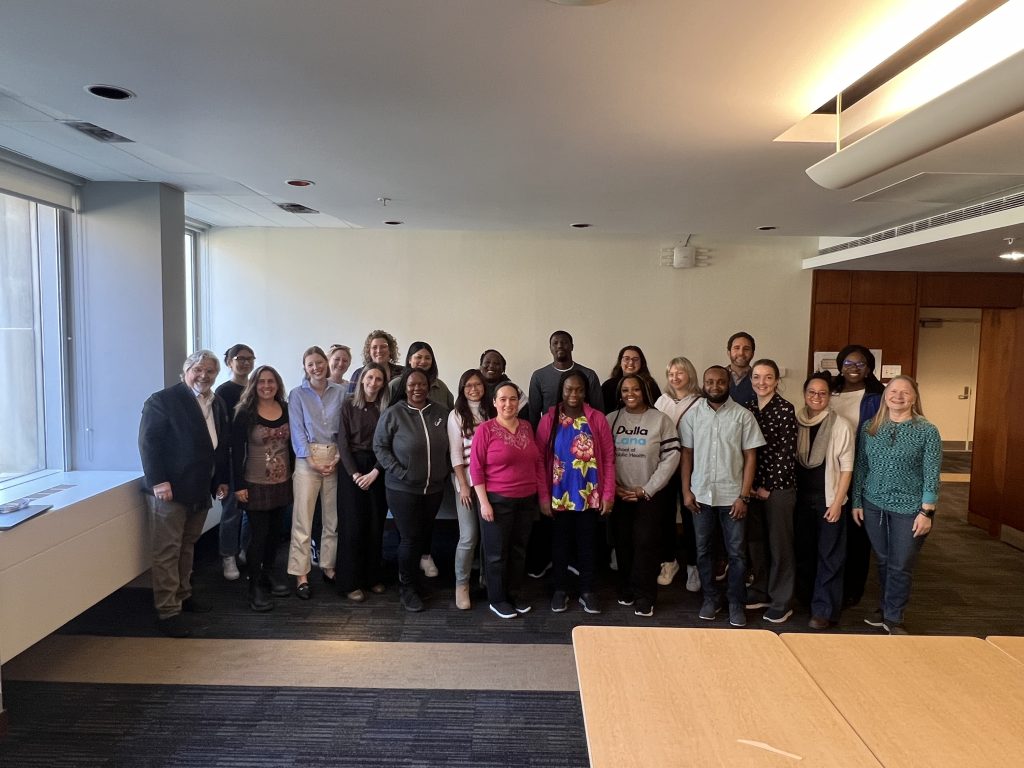DrPH Program Celebrates Academic Milestones as Cohort IV Enters the Program
November 11/2024
By Elaine Smith
Updated: November 13, 2024
Dr. Ted Witek, Professor and Director of the DrPH program at the Dalla Lana School of Public Health (DLSPH), is excited about the activity associated with the students’ academic milestones. “The inaugural cohort is in its thesis stage, Cohort II has successfully completed its comprehensive exams, and Cohort III is about to report on their applied research projects conducted this past summer. We have entered our largest intake to date since Cohort IV joined us in September.”
Witek and Associate Program Director Dr. Ashley Aimone, are delighted to be reviewing thesis proposals from the program’s first cohort of students, admitted in 2021 – evidence that the program is moving closer to graduating its first class of professional doctoral students.
The major distinctive feature of the DrPH student requirement is at least five years of professional experience, with most successful candidates having closer to 10 years in a leadership capacity. “Our goal is not to create new leaders, but to better prepare senior leaders to take on the highest level of public health leadership in Canada and abroad,” Witek said. “This is achieved by reinforcing public health foundational competencies such as data analytics and public health policy, but it also takes students into a deeper understanding of what’s required for senior leadership.”
 Kehinde Ametepee, a DrPH student, says the professional growth the program fosters quickly becomes apparent. “My DrPH journey has been nothing short of transformative,” said the research manager for the Office of the Cameco Chair in Indigenous Health and Wellness at the University of Saskatchewan. “In just my second semester, I have experienced a shift in my approach to leadership, community engagement and collaborative problem-solving. I am starting to step out of my comfort zone and take on leadership opportunities, both at and outside of work. This program isn’t just a bullet point on my CV; it’s a profound journey of self-reinvention and professional growth, and I’m excited to see where it takes me.”
Kehinde Ametepee, a DrPH student, says the professional growth the program fosters quickly becomes apparent. “My DrPH journey has been nothing short of transformative,” said the research manager for the Office of the Cameco Chair in Indigenous Health and Wellness at the University of Saskatchewan. “In just my second semester, I have experienced a shift in my approach to leadership, community engagement and collaborative problem-solving. I am starting to step out of my comfort zone and take on leadership opportunities, both at and outside of work. This program isn’t just a bullet point on my CV; it’s a profound journey of self-reinvention and professional growth, and I’m excited to see where it takes me.”
Some students have already seen growth in terms of promotions. For example, Julia Roitenberg, a student in the inaugural cohort, has been promoted to General Manager and Chief Nursing Officer at York Region Public Health, the public health department in the region just north of Toronto. Eugene Nam, a member of the second cohort, is now the Senior Manager of HIV Medical Affairs at Gilead Sciences Canada, a company working to transform HIV treatment and prevention.
The DrPH program is a valuable addition to the roster of doctoral programs offered by the University of Toronto and has the dual distinction of not only being the first professional doctorate at DLSPH, but the first DrPH Program in Canada. “The DrPH has been recognized as a degree since 1919 (e.g., Harvard, Johns Hopkins, and the London School of Hygiene and Tropical Medicine), and we have had students tell us that they have evaluated the DrPH programs in the USA and abroad, but it’s most often prohibitive to relocate. So, many were excited to see the new offering at U of T,” says Witek, who earned his MPH from Yale and DrPH from Columbia University in the City of New York.
The DrPH program continues to grow and evolve. As a hybrid program, it is taught remotely to students worldwide but requires students to engage in three on-campus intense “burst” weeks each year completing course work, collaborating, and exchanging ideas. These On Campus Forums have evolved over time to include projects such as Geographic Information Systems (GIS), crisis communication simulations, and various student led panels with real world experts. A key overarching objective is to create conditions for sharing experiences and working with students within and across various cohorts.
Witek says the students, themselves, are major proponents of new features and offer ideas to improve the program. Student feedback through written reflections and appreciative inquiry has helped to evolve the program. “Our students have done so much to shape the program, being forthright about what works well and what could foster improvement,” says Witek.